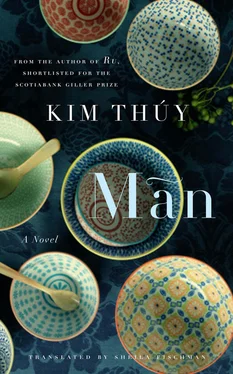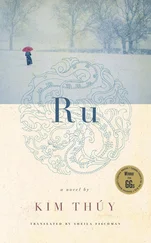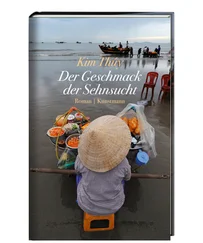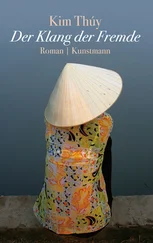Perhaps she could have escaped and gone home, because there were neither fences nor barbed wire around the village. No one had tortured her. No one had tied her down. No one had interrogated her. What they demanded was simply some essays and presentations on patriotism, courage, independence, colonialism, sacrifice. They hadn’t asked for her parents’ names, the number of her brothers and sisters, and, most important, never asked for her real name, because members of the resistance had left their families for a collective cause that overshadowed their individual lives. Unlike her, most had joined the resistance of their own free will. She was ashamed of never having felt the same unconditional love for this country which was hers as well. She was ashamed of wanting to stay within the invisible boundaries because she wanted to spare her family suspicions and accusations of treason if she went back to settle with them after living on the other shore, on enemy land. She stayed there for herself as well, to avoid living. In the village, she just had to follow.
mìn

mine
AT FIRST, SHE FOLLOWED the routine of those in charge of the kitchen and the health care group. Later, once her feet were protected by calluses and toughened scars, she would walk for weeks to translate chemistry textbooks from French to Vietnamese for workers who manufactured mines in the heart of the tropical forest. One day, she received an order to follow a female comrade wearing a brown Vietnamese shirt. She took Maman to the market, where a woman dressed in a faded lavender-coloured smock gave her a yoke. At one end, the basket contained Chinese water spinach, at the other, yams. Those enormous roots made the yoke tip back when she hoisted the bamboo carrying pole onto her shoulder. Maman lost her balance in the first seconds before she learned how to synchronize the rhythm of the two weights with her steps. She crossed the checkpoint on the bridge by blending into the crowd. A few streets from the bridge exit, she lost sight of the woman in the lavender smock. But a little farther along, another woman called out to her, grabbing her arm.
“Little sister, are your yams nice and starchy today? They look good to me. My son just had a tooth pulled. I want to make him some yam soup as a change from rice soup. He’s a fussy one. But he’s a good boy! I really don’t like grating yams. It always makes my hands sting. Can you help me? Can you come to the house and grate them for me? Come! Come with me.”
By following the woman, she was starting, unwittingly, her work as a spy for the resistance.
cha

father
SHE SLEPT IN THE woman’s kitchen for several weeks, then was moved to another house where she might prove useful. During the journey, which took her through a durian plantation, in the midst of those heavy, prickly fruit that fortunately fall only at night, she spotted her father in conversation with two men. She felt a spontaneous urge to run towards him as she used to do when she was a little girl. Her guide saw Maman’s conical hat slip towards her back, revealing her eyes, which betrayed her impulse. Before she could turn her body in the same direction as her eyes, Maman heard: “ Đừng .” The guide did not say “No” or “Stop” or “Walk,” but “Restrain yourself.” Maman looked away. Her father seemed to have aged a great deal in five years. He still had the imposing posture of a judge, but his cheeks sagged now as if they’d lost the muscles for smiling. She was afraid he would see her because that would give him one more burden to carry, one more situation to resolve and, above all, hundreds of answers to give to the authorities.
It was the last time Maman saw her father: beneath the durians, which the Vietnamese call sầu riêng . Until that day, she had never thought about the name formed by those two words, which means literally “personal sorrows.” One forgets perhaps that those sorrows, like their flesh, are sealed hermetically into compartments under a carapace bristling with thorns.
trắng

white
AS FOR ME, I never knew who my father was. Mean-spirited gossips suspect that he is white, tall and a colonizer because I have a delicate nose and luminous, pale skin. Maman often told me she’d always wanted that whiteness for me; the whiteness of bánh cuốn . She would take me to the vendor of Vietnamese crepes to watch her spread the rice flour mixture onto a piece of heavy cotton placed directly above a gigantic cauldron of boiling water. She spread the liquid by turning her ladle onto the cloth to cover it completely. In a few seconds, the cream was transformed into a thin, translucent skin that she would peel off with a bamboo stalk sharpened into a long, thin paddle. Maman claimed that she was the only mother who knew how to wrap her daughter in that crepe while she was napping so that her skin could be compared with the shimmer of snow and the brilliance of porcelain. In the same way the lotuses preserve their perfume despite the stench of the swamps where they grow, I must never allow rude comments to soil that purity.
Maman also knew the secret of how to change the shape of the nose. Some Asian women try to increase the prominence of their nasal bones with silicone implants, but Maman just had to gently pull my nose nine times every morning to Westernize it. That’s why my name is Mãn, which means “perfectly fulfilled,” or “may there be nothing left to desire,” or “may all wishes be granted.” I can ask for nothing more because my name imposes on me that state of satisfaction and satiety. Unlike Guy de Maupassant’s Jeanne, who dreamed of grasping all the joys in life when she left the convent, I grew up without dreams.
bếp

kitchen
MAMAN HAD BEEN ABLE to create a peaceful life for us between two worlds. I found that divided space again in Montreal, in my husband’s restaurant kitchen. The movements of life outside were kept on hold by the constant noise of the exhaust fan. Time was marked by the number of orders inserted in the slit of the metal bar and not by minutes or hours. In summer, it was the relentless heat that distorted the very notion of time. In winter, the fire door that opened onto the yard was permanently closed, turning the kitchen into a strongbox. The man who cleaned the filters in the exhaust fan was the only person who brought back some life to the space. He came once a month. He always knocked very loudly, as if he were in distress — though he was in a hurry only because his long list of clients demanded speed and his wife, clean hands with no oil. He was the one who taught me to use the weather as a greeting.
“Nice day.”
“It’s hot.”
“It’s hailing.”
“It’s snowing.”
“It’s windy.”
“It’s raining.”
câu hỏi

questions
IN SOUTH VIETNAM, we never talk about the weather. We never make comments, perhaps because there are no seasons, no changes, like in this kitchen. Or maybe because we accept things as they are, as they happen to us, never asking why or how.
Once, through the little square opening for serving the plates, I heard some lawyer clients say that you should only ask questions to which you already know the answers. Otherwise, it’s better to be silent. I will never find answers to my questions, and that may be why I’ve never asked one. All I did was climb up and down the stairs that connected my oven to my bed. My husband built the stairwell to protect me from the cold in winter and the vagaries of life outside in any weather.
Читать дальше













